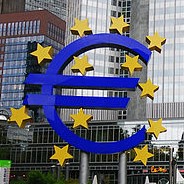Editor’s note: Catherine Cheney is reporting on German policymaking this week as part of the German-American Fulbright Commission’s Berlin Capital Program, which is funded by the German Foreign Office.
BERLIN -- After talks lasting more than 10 hours Tuesday, eurozone finance ministers reached an agreement on a bailout deal for the heavily indebted Greek economy this week, agreeing to cut Athens’ debts by $51 billion in return for austerity measures. Other steps to reduce the Greek debt to 124 percent of its gross domestic product by 2020 include cutting the interest rates on loans to the country and helping it buy back its own bonds from investors.
Germany plays a leading role in these discussions, due its economic might, the soundness of its public finances and its strong belief in a unified Europe.

